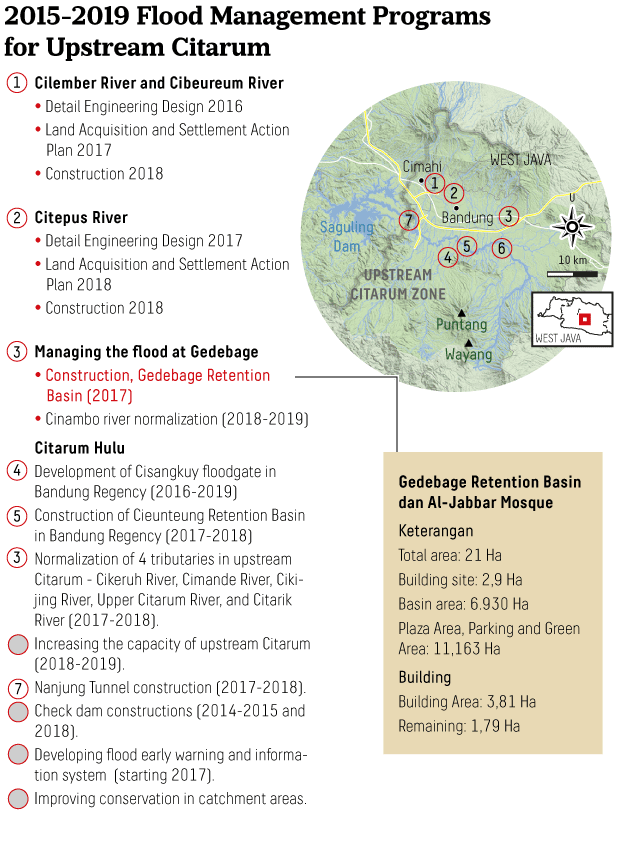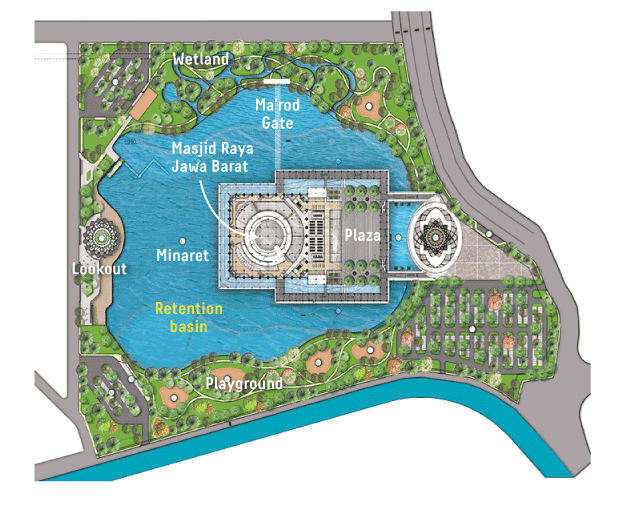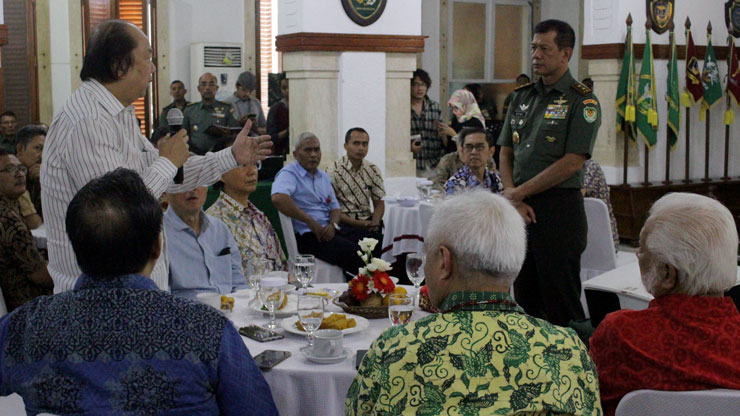Seven years. President Joko ”Jokowi” Widodo has set seven years as the target for restoring the Citarum River. ”It's not too late to fix it. However, if we do not work fast, it will be too late,” said the President.
The President stressed that the Citarum River Water Catchment Areas [DAS] must be restored. ”This step will be a model for revitalizing water catchment areas across Indonesia, such as Bengawan Solo and Brantas,” said Jokowi on Thursday (22/2) while inspecting the upstream Citarum River in Tarumajaya village, Kertasari district, Bandung regency, West Java.
In confirming his commitment, President Jokowi promised to monitor the Citarum River revitalization project every three months, and not more than every six months. Therefore, said the President, rescuing the Citarum was not mere ceremony.
The President made his statement in the presence of a number of ministers, including Cabinet Secretary Pramono Anung, Forestry and Environment Minister Siti Nurbaya Bakar and Public Works and Housing Minister Basuki Hadimuljono.

President Joko Widodo listens to National Disaster Mitigation Agency head Willem Rampangilei (far right) and Public Works and Housing Minister Basuki Hadimuljono on the construction of retention ponds in Dayeuh Kolot, Bandung regency, on Apr. 12, 2017.
Also present at the inspection visit were West Java Governor Ahmad Heryawan, Kodam III-Siliwangi Military Commander Maj. Gen. Doni Monardo, West Java Police chief Insp. Gen. Agung Budi Maryoto and Bandung Regent Dadang Naser.
It was appropriate for President Jokowi to be inspecting the upstream Citarum. Even though the efforts to revitalize the Citarum River must be done simultaneously along the length of the river, they must first begin with the upstream area.


Several weeks before the President’s inspection visit, cleaning the river’s upstream area had commenced on Sunday (28/1). Kodam III-Siliwangi Military Commander Maj. Gen. Doni Monardo directly participated in the Citarum River’s clean-up efforts.
”Residents of West Java on the Citarum’s banks are afraid the springs will be lost. This is a serious problem. Because, West Java is inhabited by more than 40 million people and is a buffer province of the capital,” said Doni, who is also vice chairman of the Citarum River Revitalization task force.
Since January 2018, thousands of soldiers from the Indonesian Military (TNI), along with local government officials and residents, have been working to clean up the Citarum. Special boats to transport garbage have also been assembled for the effort.
The law prohibiting the contamination of the Citarum River is also being enforced. By the end of January 2018, the West Java Police had closed down the operations of three companies for allegedly dumping untreated toxic and hazardous waste directly into the river.
The three companies are CV Xpress Laundry, CV Ciharuman Laundry and CV Elvito Washing, all of which operate in Jelegong village of Kutawaringin district, Bandung regency. ”Police cordons have been installed at the sites,” said West Java Police chief Insp. Gen. Budi Maryoto.
Many parties have finally become serious about revitalizing the Citarum River. On Tuesday (16/1), President Jokowi himself presided over a limited meeting on the Citarum Water Catchment Area, which was held in Bandung at the Graha Wiksa Praniti headquarters of the Public Works and Housing Ministry’s housing and settlement research and development division.
Of course, Citarum has never been neglected.
According to the West Java executive director of the Indonesian Forum for the Environment (Walhi), Dadan Ramdan, approximately Rp 4.5 trillion had been channeled in the last 30 years for restoring the Citarum River. However, the efforts produced no visible results.
Projects on the Citarum River
February 2015
One hundred of the needed 400 dams constructed. The lowest construction cost was Rp 200 million per regulating dam, and Rp 40 million per embankment dam.
June 2016
The West Java administration allocates around Rp 24 billion of the provincial budget to restore the Citarum River.
December 2017
The Kodam III-Siliwangi Military Command initiates the Aromatic Citarum program in cooperation with the West Java administration.
January 2018
Pollution and waste management for the Citarum River is divided into 20 sectors. The initiative involves local governments, the TNI, the National Police, the river basin agency, environmental groups and others.
The fact is that the Citarum is still dirty today, and more than that, it is also polluted. The pollution does not only affect the river, but also all living things, including people, who live and depend on the Citarum.
A Kompas report that appeared in the Saturday, March 3, 2018 edition on page 20, titled ”Little Concern for Safeguarding the River”, showed the dirty condition of the Citarum River. The exact location covered in the report was at the meeting point of the Cikapundung and Citarum rivers.
The area where the two rivers met had become dirty again, even though Kodam III-Siliwangi Military Command personnel, local residents and representatives from a number of environmental groups had cleaned the area three days earlier. Cleaning the river seems to be a waste of time.
‘Military Operation’
What can be done to clean up the Citarum? A ”military operation” could be redeployed, because the Kodam III-Siliwangi Military Command has a strong commitment and can send thousands of soldiers in a clean-up operation.
Thousands of residents can also be asked to work hard and thousands of environmental activists can also take part in cleaning up the river. ”Law enforcement would be stronger, if it is done through a single door by the West Java Police and the West Java High Court,” said Doni.
Doni also expressed hope that a presidential regulation (Perpres) on the Citarum River Revitalization task force would be issued soon. Armed with such a regulation, Doni was confident that law enforcement could effectively prosecute violators.
The question is, can the Citarum be restored to its fragrant state only with the presidential regulation? Can the regulation settle coordination issues? Had not the National Development Planning Agency (Bappenas), which is good at coordination, launched the Cita Citarum program earlier?
Awaiting Community’s Role
It may be that a Citarum that is clean, fragrant and sustainable can only be achieved with the participation of the entire community of stakeholders, beyond those who live and depend on the Citarum, but also those who live in the river’s watershed areas and along its tributaries.
Why? A piece of trash tossed into the Citarum River anywhere within a dozen kilometers will flow downstream. Household waste channeled through the city drainage system can also be harmful for the river.
The local citizenry have begun to participate. ”Today, a number of people on the Citarum’s banks and its tributaries are enthusiastic about the garbage bank,” Fifie Rahardja, the founder of Bandung regency’s Bank Sampah Bersinar (BSB), said at the “Shop with Garbage” bazaar (Kompas, Friday, Jan. 19, 2018).
Held at Cipaganti in the river basin of the Cikapundung – one of the Citarum’s tributaries – the residents enthusiastically ”trade” their garbage. Local residents brought inorganic waste from plastic to coated paper, and from glass to motorcycle tires, to the event. They then exchanged the garbage for a voucher to purchase basic commodities, clothing or footwear at low prices.
”Since 2014, the number of BSB customers has reached 7,000 people. Total savings in the garbage bank reaches Rp 200 million per year. The price of garbage ranges from Rp 1,500 to Rp 2,000 per kilogram. In the past, garbage was thrown away into the river,” Fifie said.
BSB is one of the initiatives that aim to attain a better future for the Citarum. The initiative needed to be maintained and duplicated in other areas.
On the other side, local governments are also making real efforts to clean the Citarum. Bandung Environment and Sanitation agency secretary Dedy Dharmawan said that, for example, the government was ready to accommodate up to 60 tons per day of compost from local residents.
”People must reduce the volume of waste which is thrown into the river. Households can process waste into liquid organic fertilizer or compost,” said Dedy.
The Citarum River Basin Agency’s data shows that about 20,462 tons of organic and inorganic waste is dumped per day in the Bandung river basin, which covers Bandung regency, West Bandung regency, Sumedang regency and the city of Cimahi. Of that amount, 71 percent is not being transported to the garbage dump, so it is likely that the garbage is simply dumped into the Citarum.
Private Movement
The private sector has been supporting the Aromatic Citarum program to meet the need for synergy. Four private companies have donated Rp 20 billion to restore the river to its natural condition.

Founder of Mayapada Group, Tahir (left) speaks with Commander of Regional Military Command III / Siliwangi Major General Doni Monardo (right) in a meeting with a number of businessmen in Cimahi and Bandung area at Siliwangi Hall Kodam III Siliwangi Headquarters, Bandung City, West Java, Friday (12/1/ 2018).
Dato 'Sri Tahir, the founder of the Mayapada Group, disclosed its commitment to fund the project in Friday (12/1) at the Kodam III/-iliwangi Military Command in Bandung. Besides Tahir’s foundation, PT Intiland Development Tbk, PT Sioeng Group and PT Hanson International Tbk also provided grants to the project.
”We have a moral obligation to restore the condition of the Citarum River. At least 80 percent of Jakarta’s residents enjoy the water,” said Tahir.
Tahir is correct: The Citarum’s water is processed into drinking water for residents in the capital.
According to Doni, Artha Graha had also expressed interest in contributing its seedling development, cultivation and tree planting capabilities to 80,000 hectares of unproductive land in the Citarum watershed. The private sector has joined the movement, but the participation of other actors is still needed.
The actions of the public and private sectors have at least proven the extent of the efforts to restore the Citarum. The support clearly should not be limited to developing infrastructure, and other matters, such as waste management, should be attended to very seriously by involving the wider public.
The participation of all members of society, whoever they may be, is critical to maintaining the Citarum River. More important, however, is an effort to educate the younger generation to cherish the Citarum. Cleaning the river will not happen overnight, and the Citarum will be needed for future generations.
Seven years is a realistic timeframe for restoring the Citarum.












